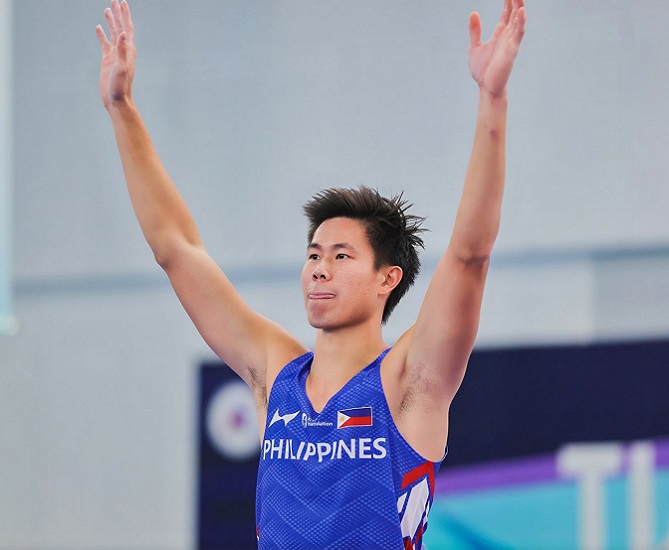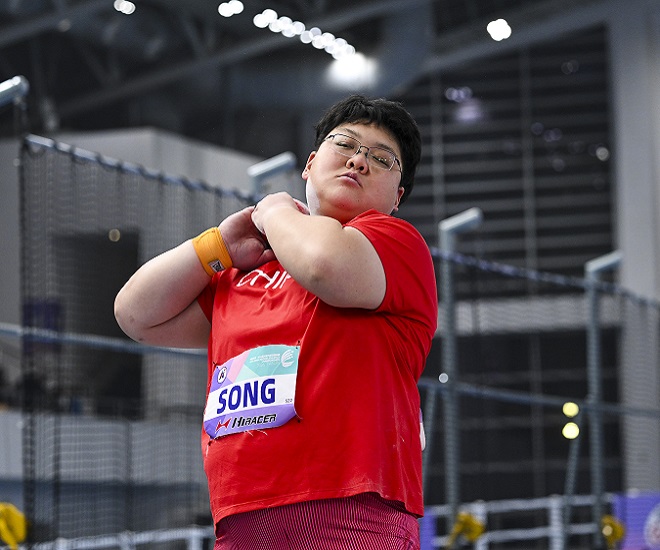
Close finishes, Duplantis world record highlights in Tokyo
Record crowds watch World Championships
A record number of 53 nations got into the medals tally as the 20th edition of the World athletics championships concluded at a rain-ravaged National Stadium in Tokyo on Sunday (Sept 21).
The number of small nations getting among the medals on the global stage was remarkable, and so too, the exciting fare on nine days that saw one world record and nine championships records being bettered.
Expectedly, the Americans topped the medals table with 26 medals including 16 gold, while Kenya, sweeping the women’s middle-distance and distance events, came second with 11 medals including seven gold. Some of the Olympic and world champions unexpectedly met with reversals against opposition from unexpected quarters, but there was no stopping the likes of Faith Kipyegon and Beatrice Chebet of Kenya.
For Asia, there was disappointment as the continent ended without a gold compared to the three it had gathered last time at Budapest and five in the 2022 edition in Eugene. Especially galling was Japan finishing so poorly at home with just two bronze medals in racewalking events. For India, too, this was a disappointing edition as the country that had won its first gold in the World championships last time through Neeraj Chopra in javelin, finished without a medal on this occasion with just three making the finals in a 19-member squad.
As was to be expected, there were a number of top-drawer performances apart from that of Mondo Duplantis who set his fourth world record of the season in adding the third World gold to his collection. He has also won the last two Olympics title, the first one coming at the very same Tokyo stadium.
American Sydney McLaughlin-Levronne should get precedence over the others on track when we talk of exceptional performances that left a mark for generations to come. She clocked a championship record in the women’s 400m, that of 47.78s that came behind German Marita Koch’s storeyed world record of 47.60s in the 1985 World Cup in Canberra. McLaughlin-Levronne led every segment in a race in which she was up against the defending champion Marileidi Paulino of Dominican Republic and 2019 world champion and this season’s world-leader Salwa Eid Naser of Bahrain.
Melissa Jefferson-Wooden of the US completed a treble winning the sprints plus being part of the shorter relay team anchored brilliantly by Sha’carri Richardosn, the defending 100m champion who had not been in the best of form this season. Jefferson-Wooden was the first American woman to score a sprint double at these championships and the fourth one across the world. She was also the first American to win the 200m since Allyson Felix won it in 2009.
Shelly-Ann Fraser-Pryce of Jamaica, winner of ten world titles prior to this edition did not win an individual medal but she did add a silver from the 4x100m relay to wind up a legendary career spanning 18 years. Olympic 100m champion of St Lucia, Julien Alfred, took the bronze in the shorter sprint but pulled out of the 200m due to an injury.
There was a double for Beatrice Chebet of Kenya in the distance events, she edging out in the 5000m her more famous countrywoman and friend Faith Kipyegon who added her fourth world title in the 1500m where she is the world-record holder.
Kenya’s memorable streak of victories in Tokyo was capped by a thrilling win in the 800m on the concluding day by Lilian Odira who shattered the 1983 championship record of Czech Jarmila Kratochvilova timing 1:54.62. The top three bettered 1:55 with Olympic champion coming third behind team-mate Georgia Hunter Bell by just one-hundredth of a second. The timings in the men’s and women’s 800m this season have been incredible and at the same time raising debates on the social media. Twenty-six-year-old Odira’s best achievement till Tokyo had been a silver in the African championship in 2024.
Noah Lyles coming back to win the 200m after losing the 100m and he anchoring the US team in the 4x100m were on expected lines. He had not been in great touch this season, competing sparingly and being tipped behind Jamaicans Kishane Thompson for the shorter dash. In the event it was another Jamaican Oblique Seville who took the 100m title, watched by the legend, countryman Usain Bolt from the VIP box.
Unexpected was Botswana’s Collen Kebinastshipi anchoring his team to the title in the 4x100m against the 400m hurdle champion Rai Benjamin by the barest of margins 2:57.76 to 2:57.83. The Olympic champion in the 200m who had a disappointing individual outing this time, also ran a fine leg in the 4x400m to somewhat make up for the reversals earlier.
The Americans took all the other relays. They were re-instated in the men’s 4x400 after a re-run of the heats with Kenya since Zambia had impeded both the teams in one of the exchanges. South Africa was allowed to have a re-run in the 4x100m all on its own on another impediment in the heats but failed.
Japan had disappointment in the men’s 4x100m relay as it finished seventh while the Chinese went out in the men’s 4x400m relay in the heats despite clocking a national record of 3:00.77. In the women’s relays, China was eliminated in the heats of the 4x100m. Japan finished last in the mixed relay.
China and Japan had some success in the walk events, expectedly so, though a gold remained a far cry. Japan especially was expected to have great home advantage but as it turned out, the host could manage only two bronze medals on the road through Hayato Katsuki (men’s 35km) and Nanako Fujii (women’s 20km).
The greatest disappointment for the home fans was the eclipse of favourite Toshikazu Yamanishi in the 20km as he received a two-minute penalty after being in the lead. He was the world-record holder and two-time world champion in this event.
For China there was a silver from 20km walker Wang Zhaozhao behind Brazilian Cai Bonfin in the men’s section and a fourth-place finish for Peng Li in the women’s 35km walk. Spaniard Maria Perez completed the 20km-35km double despite the hot conditions. Bonfin’s men’s gold in 20km came through a last-stage spurt in better climate.
Heat that troubled the distance competitors in the early days gave way to cooler climate later on as rains lashed Tokyo. Particularly severe were the rains on the final day of the championships causing a hold-up of around two hours in men’s discus and slightly lesser in the women’s high jump that had made a start. The discus event was started all over again after the first two results were annulled.
Two-time world champion Daniel Stahl, who had also won the Olympics gold in Tokyo in 2021, won the men’s discus title with a last-round throw of 70.47m that replaced Mykolas Alekna, the world record holder from Lithuania at the top. Stahl danced around in jubilation as Alekna’s dream of a gold after a bronze last time remained unfulfilled.
The 2012 Olympic champion Keshorn Walcott had his dream fulfilled after being in the shadows of Neeraj Chopra, Anderson Peters and Arshad Nadeem in the intervening period with a surprise in the javelin contest with a season best 88.16m. Chopra finished eighth, his worst finish in three World championships while Nadeem, Olympic champion last year and Pakistan’s only Worlds medallist, coming behind Chopra last time, came tenth. He was inconsolable in the end.
Talking of last-gasp victories, the one in men’s triple jump by Pedro Pablo Pichardo was spectacular as he produced a world-leading 17.91m in the last round to edge Italian Andrea Dallavale who had a 17.64m. Chinese world-leader Wang Ruiting was eliminated in the qualification while Zhu Yaming, on whom the Chinese expectations might have been finished at 11th in the final with 16.51m.
Winfred Yavi, champion from Bahrain last time, was beaten in the women’s 3000m steeplechase by Kenyan Faith Cherotich but took the defeat lightly saying that she was happy that at least had the silver.
Not so was Kitaguchi who was in tears as she finished 14th in the women’s javelin qualification where she was the defending champion as well as the Olympic champion. The Japanese had battled through injuries this season and was not a favourite in Tokyo though some still tipped her to win. The title went to little-known Yulesy Angulo of Ecuador who posted 65.12m, a national record.
Duplantis is a big-stage performer. He raised the bar to world record height of 6.30m to better his own record of 6.29m on his last Emmanouli Karalis of Greece was second at 6.00m. Philippines’ John Obiena, silver medallist at Budapest, failed to make the final this time, with 5.55m.
In contrast to the empty stadium that greeted the athletes in the 2021 Olympics because of Covid-19 and crowd restrictions, the World championships at the same stadium witnessed a record crowd of more than 6,19,000 attended the meet. Duplantis and several others said they were very encouraged to perform in front of such enthusiastic, disciplined fans.
Television audiences also touched record figures on certain days and certain networks as per World Athletics which said that the internet figures for the website traffic also reached record heights compared to the previous edition.
There was much to rejoice for the US, Kenya and Canada, the top three countries in the medals tally. But the Asian countries especially Japan and India should have a hard look at the declining standards at the world level. China had two silver and two bronze, Korea one silver through high jumper Woo Sang-Yeok , Bahrain one silver, Japan two bronze and Qatar one bronze,
Qatar’s bronze came from 400m hurdler Abderrahman Samba who anchored the team to a national record of 3:00.15 in helping it qualify for the final where it finished fifth. Qatar had won a bronze last time also through high jumper Essa Mutaz Barshim who pulled out due to an injury before the start of the championships. His run-up was not promising enough to warrant enthusiasm among his countless fans. Italian Gianmarco Tamberi, who famously shared the gold with Barshim in the Tokyo Olympics, was eliminated this time in qualification with 2.16m.
Comments are closed.


